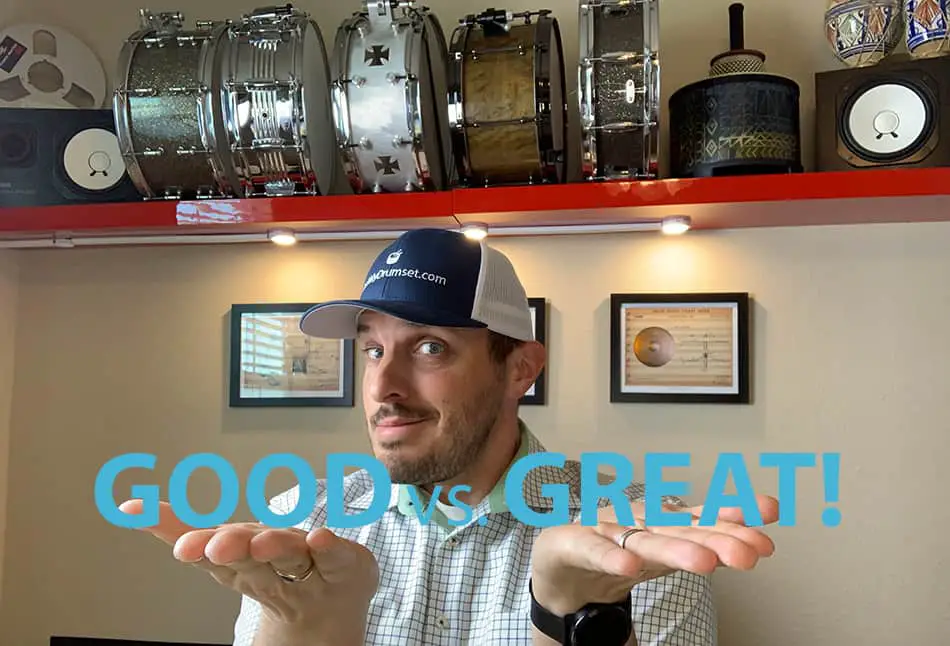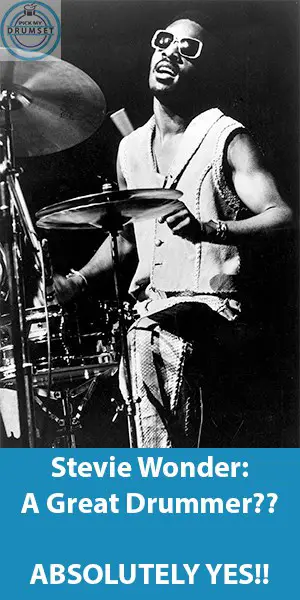
In my multiple decades as a drummer, I’ve been around, heard and seen many drummers in their prime, whether it was on stage, in private lessons or on video. Of all of these drummers, a few handfuls are what I would classify as ‘great’, but the question remains…
What makes a good drummer great: talent vs. hard work? A great drummer plays things that are extremely hard to duplicate. While there is no secret recipe for drumming greatness, a healthy combination of natural talent and dedicated hard work is necessary for the vast majority of good drummers. Going from good to great is a mystical combination of raw talent, genetics and dedication.
Beyond the theoretical question though, I think it’s worth exploring this topic a bit more in depth and explore the journey that some of the drumming greats have been on in order to better define your own percussive journey.
Characteristics of a Great Drummer
While there are no definitions of the magic that goes into being truly great, I think that there are certain qualities that define what a great drummer truly is and it’s important to note that these are details that help distinguish between good and great.
- Perpetual Students: Great drummers are never done learning and constantly strive to pick up new techniques and rhythms in a constant quest to master their craft.
- They Take Feedback Well: This aligns with the above point because in order to be a good student, you have to be open to constructive criticism and then know how to apply it to your craft.
- Dedication & Passion: The greats have made drumming one of the dominant forces in their life, sometimes to the detriment of personal relationships. They are dedicated to their craft and spend hours upon hours, sweating over the details.
- Time & Feel: Novels could be written about these two descriptors, but great drummers have an impeccable sense of time and can use their feel to play with time in a way that only a few people can.
- Musicality: A great drummer can seamlessly blend in with an ensemble and play with extreme sensitivity in relation to other musicians. This requires listening ability, extensive musical knowledge and the ability to quickly adapt to different styles and situations.
With all of that said, I think that great drumming isn’t just about who has the best chops, can squeeze the most notes into a drum fill or who can technically play everything perfectly. Great drumming goes beyond that and incorporates human elements, which is to say the differences between all of us which make us unique.
My next statement might be somewhat controversial, but I firmly qualify Ringo Starr of the Beatles as a great drummer. Was he the most talented and technically capable drummer? Far from it! What Ringo brought to the table was a feel and an approach to drum parts which were uniquely his own.
If you go back and listen to those old Beatles records and really analyze his drum parts – they are extremely unconventional and contain musical phrases which are far from vanilla. If you listen to songs like “Come Together” or “In My Life”, all of them feature unique and perfectly musical drum parts that are vital pieces of each of those songs.
Not only in Ringo’s case, but also true for all great drummers – the main differentiator is that they play music, not just drums. They play what is needed to make the music whole. They contribute to the entirety of the musical outcome via a perfect blend of natural talent and ability.
The Role of Talent in Drumming Greatness
I think that it is without question that natural talent or inclination towards being a drummer/musician is important. Your talents tend to influence the way that you interpret and think about music – and are therefor much harder to learn and practice than picking up new techniques.
It can certainly be said that early childhood exposure to music and being raised in a musical family can help nurture this sort of thing and drive a natural inclination to music – but there are also plenty of examples of great musicians whose families were not necessarily musically inclined.
When I think about drummers with innate talent, a few great names come to mind: Dave Grohl, John Bonham, Steve Gadd, etc. These are people who had that magical combination of genes that allowed them to seamlessly channel their interpretation of music into the physical (and in the case of these players, bombastic) movements.
Dave Grohl has mentioned in several interviews that he is pretty much self-taught and by many accounts is considered to be the best rock drummer of all time. Yes – he worked hard and was obsessed with playing music, but his talents enabled this work to translate into extremely potent musicianship.
To further illustrate the importance of talent in the equation, I wanted to look for an example fo someone who isn’t necessarily known for their drumming is actually extremely accomplished…if not great at it!
Look no further than the great Stevie Wonder, who is not generally know to be a drummer. That said, (and some may argue with me on this) I came across some footage and of him playing drums on TV in Italy in 1969 and it absolutely blew me away:

…and this is not an isolated occurrence. There are several videos on YouTube of him playing drums in a fantastically musical way.
Now…is this the most technically advanced playing in the world? No. Is it musical? Absolutely. Is it unique? Without a doubt. Is it amazing to watch? 100% yes!
That’s why in my opinion, Stevie Wonder’s playing squarely qualifies as great drumming, primarily because it would be insanely hard to duplicate due to his natural talent and musicality, even with years of practice. Additionally, it would appear that someone quite knowledgeable agrees:
“Stevie Wonder has to be the greatest drummer of our time”
-Eric Clapton
Do you agree as well?
The Work of a Drummer
Whether you are innately talented or not – honing the craft of drumming is an unforgiving and constant battle against the clock, your own physical limitations and life circumstances. In other words, you have to practice A LOT and you have to practice in the right way.
The term “shedding” is often used in reference to practicing because of the notion that you’ll go lock yourself in a shed for hours on end to practice your craft.
I would also say that it’s not only necessary to master the instrument itself, but you have to develop yourself as a musician. One of the only ways of doing this is by playing with other talented musicians in various musical settings.
No matter how naturally talented you are, becoming a “good” drummer will take a lot of work and dedication. Mastering rudiments, four way coordination, dynamics, tempos, different styles… The drummer’s to-do list is seemingly endless and takes a lot of work to get right.
Final Thoughts
The question remains though – can a drummer be GREAT without the work? I would say that in 99% of cases the answer is a firm ‘no’. However, as our Stevie Wonder case study points out, there are some pretty remarkable exceptions out there.
At the end of the day, this topic is somewhat dependent on your own definition of ‘great’, however I think I’ve laid out the fact that a healthy combination of talent and work are necessary in just the right combination to produce drumming greatness.
Related Questions
How to tell if you’re a good drummer: One of the best ways to gauge how good of a drummer you are is to record yourself, preferably with video, and listening back to what you recorded. It will not only indicate (in your opinion) how good you are, but it will also give you guidance on what you need to improve to become even better!
What are the signs of a bad drummer: While the definition of a ‘bad drummer’ is easily debatable, I would consider drummers who are bad timekeepers are generally not good. A lack of dynamics is another telltale sign of a non-musical drummer.
